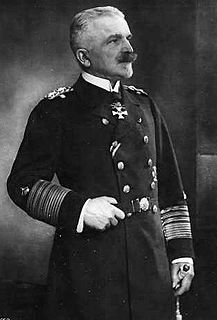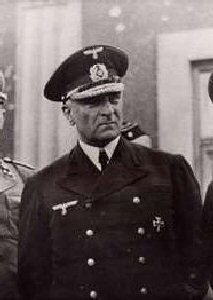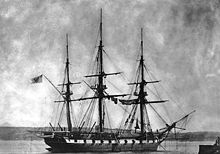
The Reichsmarine was the name of the German Navy during the Weimar Republic and first two years of Nazi Germany. It was the naval branch of the Reichswehr, existing from 1919 to 1935. In 1935, it became known as the Kriegsmarine, a branch of the Wehrmacht; a change implemented by Adolf Hitler. Many of the administrative and organizational tenets of the Reichsmarine were then carried over into the organization of the Kriegsmarine.

Hans Ludwig Raimund von Koester was a German naval officer who served in the Prussian Navy and later in the Imperial German Navy. He retired as a Grand Admiral.

Hugo von Pohl was a German admiral who served during the First World War. He joined the Navy in 1872 and served in various capacities, including with the new torpedo boats in the 1880s, and in the Reichsmarineamt in the 1890s. He eventually reached the rank of Vizeadmiral and held the position of Chief of the Admiralty Staff in 1913. He commanded the German High Seas Fleet from February 1915 until January 1916. As the commander of the surface fleet, he was exceedingly cautious, and did not engage the High Seas Fleet in any actions with the British Grand Fleet. Pohl was an outspoken advocate of unrestricted submarine warfare, and he put the policy into effect once he took command of the fleet on 4 February 1915. Seriously ill from liver cancer by January 1916, Pohl was replaced by Reinhard Scheer that month. Pohl died a month later.
The Admiralty was a former military department in command of the Royal Navy.
The Seekriegsleitung or SKL was a higher command staff section of the Kaiserliche Marine and the Kriegsmarine of Germany during the World Wars.

Adolf von Trotha was a German admiral in the Kaiserliche Marine. After the German revolution he briefly served as the first Chef der Admiralität, which replaced the imperial Reichsmarineamt. After supporting the Kapp-Lüttwitz Putsch of March 1920 he resigned his post.
The German Imperial Naval Cabinet, a government office of the German Imperial Navy, 1871-1918, was responsible for commanding naval officers, marine officers, engineers, naval stores, and munitions.
Ernst Otto von Diederichs was an Admiral of the Imperial German Navy, serving in the Prussian Navy and the Navy of the North German Confederation.

The German Imperial Naval Academy (Marineakademie) at Kiel, Germany, was from 1872 until the end of the First World War the higher education institution of the German Imperial Navy, Kaiserliche Marine, where naval officers were prepared for problems in higher levels of command.

The Prussian Navy Department (Marineministerium) grew out of that established by the Frankfurt National Assembly (1848-1849) for its ‘Imperial Fleet' Reichsflotte. From 1866 it served additionally as the Navy Department of the North German Confederation.

The Imperial Naval Office was a government agency of the German Empire. It was established in April 1889, when the German Imperial Admiralty was abolished and its duties divided among three new entities: the Imperial Naval High Command, the Imperial Naval Cabinet and the Imperial Naval Office performing the functions of a ministry for the Imperial German Navy.
Carl Eduard Heusner was a Vice-Admiral of the German Imperial Navy.
Friedrich von Hollmann was an Admiral of the German Imperial Navy and Secretary of the German Imperial Naval Office under Emperor Wilhelm II.

The German Imperial Naval High Command was an office of the German Empire which existed from 1 April 1889 until 14 March 1899 to command the German Imperial Navy. A similarly named office existed in the Prussian Navy and the Kriegsmarine of Nazi Germany.

The German Imperial Admiralty Staff was one of four command agencies for the administration of the Imperial German Navy from 1899 to 1918. While the German Emperor Wilhelm II as commander-in-chief exercised supreme operational command and control of the naval forces, the military staff was split into the Admiralty, the Naval Office, the Naval Cabinet, and the Inspector-General. The command structure had a negative impact on German naval warfare in World War I, as a professional head of the Imperial Navy, similar to the First Sea Lord, was not established until August 1918. After the war and the German Revolution of 1918–19, the Admiralty Staff became subordinate to the Naval Office and was finally disestablished by order of the German President.

Freiherr Otto Ferdinand Maximilian Leopold von der Goltz was an Admiral of the Imperial German Navy.

The Ministry of the Reichswehr or Reich Ministry of Defence was the defence ministry of the Weimar Republic and the early Third Reich. The 1919 Weimar Constitution provided for a unified, national ministry of defence to coordinate the new Reichswehr, and that ministry was set up in October 1919, from the existing Prussian War Ministry and Reichsmarineamt. It was based in the Bendlerblock building. The Wehrgesetz of 21 May 1935 renamed it the Reich Ministry of War, which was then abolished in 1938 and replaced with the Oberkommando der Wehrmacht.
William Otto Ernst Michaelis was a German viceadmiral and head of the Naval Command within the Ministry of the Reichswehr in the Weimar Republic.

SMS Blücher was a Bismarck-class corvette built for the German Kaiserliche Marine in the late 1870s. The Bismarck-class corvettes were ordered as part of a major naval construction program in the early 1870s, and she was designed to serve as a fleet scout and on extended tours in Germany's colonial empire. Blücher was laid down in March 1876, launched in September 1877, and was commissioned into the fleet in late 1878. Unlike her sister ships, Blücher was converted shortly after entering service into a torpedo training ship to experiment with the new self-propelled torpedoes and develop German torpedo doctrine.

Friedrich Lützow was a German naval officer who served in the Kaiserliche Marine, the Reichsmarine and the Kriegsmarine, eventually reaching the rank of Vizeadmiral during World War II. He was also a writer on naval warfare.
















